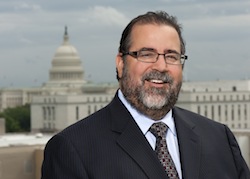The key to continued growth, says Renewable Fuels Association (RFA) President and CEO Bob Dinneen, is the availability of higher level ethanol blends such as E15 and other renewable fuels. Dinneen submitted written testimony to the House Energy and Commerce Committee Subcommittee on Environment and Economy on April 19. Dinneen testified in support of the Domestic Fuels Protection Act, aimed at easing the regulatory burden for fuel retailers to offer consumers additional renewable fuels at the pump, including E15.
 “[T]he current regulatory structure provides no pathway to certify existing equipment for anything other than fossil fuels, even when test data demonstrates its safety,” Dinneen testified. “The Domestic Fuels Protection Act allows EPA to create such a process, thereby providing new fuels access to the marketplace without having to expend time and resources on new infrastructure unnecessarily.”
“[T]he current regulatory structure provides no pathway to certify existing equipment for anything other than fossil fuels, even when test data demonstrates its safety,” Dinneen testified. “The Domestic Fuels Protection Act allows EPA to create such a process, thereby providing new fuels access to the marketplace without having to expend time and resources on new infrastructure unnecessarily.”
The goal of the Domestic Fuels Protection Act is to protect retailers. If equipment used by retailers to dispense EPA approved fuels meets fuel specifications, and a retailer properly informs customers about the approved use of the fuel, then they will be protected from any meritless lawsuits. It is important to understand that this Bill does not in any way effect the Renewable Fuels Standard (RFS) nor current approvals for the sale and use of E15.
“I can say without hyperbole or reservation that the RFS has been the most successful energy policy this nation has ever implemented,” continued Dinneen. “It should be vigorously defended and maintained, and allowed to reach its full potential of 36 billion gallons of clean burning, renewable fuel.” But to achieve this, market access for ethanol and other renewable fuels must be expanded.
Dinneen concluded, “The RFS is entering a critical period, however. The volumes of renewable fuel refiners are required to meet can no longer be met by just 10% ethanol. Greater volumes of ethanol and a greater diversity of biofuels and feedstocks will be necessary to meet the increasing volumes required by the RFS. Critically, these fuels will be attempting to enter the marketplace amidst a complicated regulatory structure that favors incumbent technologies and discourages market access. Gasoline marketers deserve the certainty that they will not be penalized for utilizing a new fuel or fuel blend that has been approved for use by the U.S. Environmental Protection Agency (EPA).”

